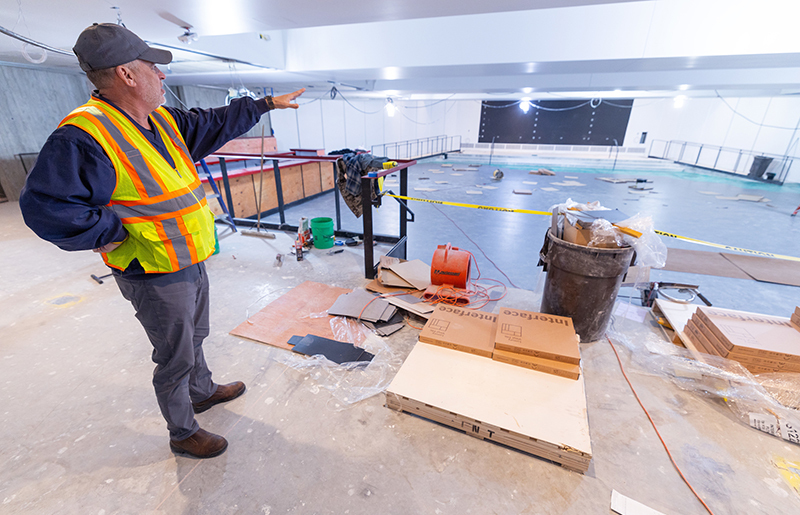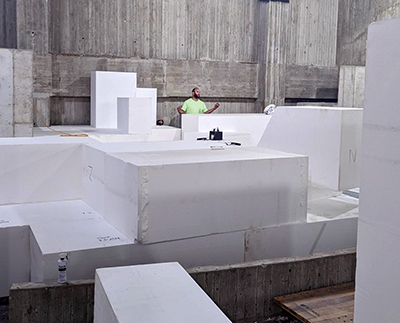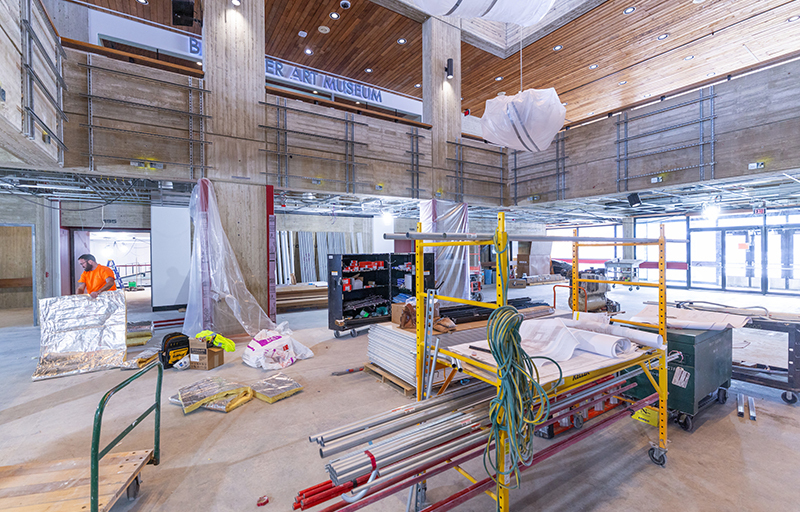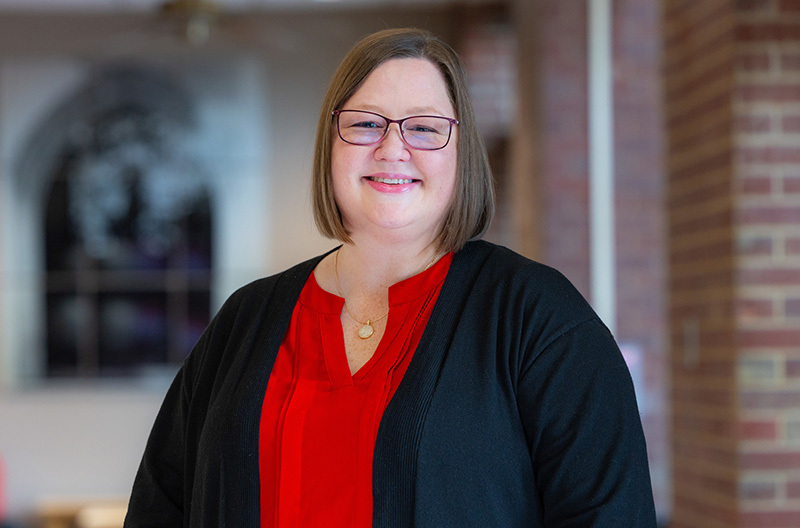Partial renovation of Scheman enters final month

Construction manager Steve Nelson, facilities planning and management, explains the process of creating a new event space in the former Benton Auditorium, Scheman Building. Photo by Christopher Gannon.
A remodel of floors one and two in the east part of the 50-year-old Scheman Building is creating additional fan social spaces for athletics department use prior to competitions next door at Hilton Coliseum. The improvements also are intended to enhance the experience of other university and community groups that rent Scheman for professional and social events. When the work wraps up around Feb. 1, Scheman will continue to operate as a multipurpose conference center.

Crews positioned 8-by-4-by-4 geofoam cubes in the lower portion of Benton Auditorium. A concrete floor was poured over this, and vinyl flooring and carpet laid as top layers.
Since mid-May, the former theater-style Benton Auditorium has been converted to a one-level room featuring two beverage service counters and a slightly elevated stage along its east wall. Also on the second level, the north food service area and a northeast hospitality area were renovated. Ground and first-floor restrooms were gutted and rebuilt. The project has upgraded mechanical and electrical infrastructure in the impacted areas. It also includes new flooring, lighting, ceiling speakers, and lots of video boards and Cyclone branding on the second level.
Meeting spaces and the kitchen on the west side of Scheman weren't impacted by this project.

Metal brackets on the walls of the square void between the second and third levels of the Scheman Building will support a ribbon of video screens. Photo by Christopher Gannon.
A reminder to use more of your benefits in 2025
A new year brings promise and challenges. Iowa State offers programs to assist faculty and staff in numerous ways. Whether you put a focus on self-care or want to make financial changes, here's a reminder about options available to all employees.
Honored
Iowa State was awarded a 2024 Platinum Bell Seal for Workplace Mental Health by Mental Health America. The Bell Seal is a first-of-its-kind workplace mental health certification to recognize employers striving to create mentally healthy workplaces for their employees.
Support options
Employee Assistance Program (EAP): Free access to confidential, professional services for dealing with a personal problem. Licensed professional counselors help address stress, anxiety, depression, parenting, relationships, substance abuse, and legal and financial concerns. The goal is to find solutions before the problem affects someone's health or job performance.
On-site counseling: Melanie Clark is an EAP counselor who comes to campus once a week for in-person counseling sessions with employees or their family members. Clark is on campus Mondays (9 a.m.-4 p.m., last appointment begins at 4 p.m.). Her accessible campus office is on the first floor of the Communications Building.
Mental health website: Lists of emergency and nonemergency services for employees, family members or students in distress.
Self-help options
Adventure2: A free online portal with individual and team activities that improve well-being. Topics address physical, mental, emotional and work issues. Participants earn points throughout the year and receive prizes. Adventure2's services portal provides access to tools such as the parenting success portal for family-related content or the enrich financial portal for financial planning.
Free trial membership
Recreation services is offering ISU employees a free seven-day trial membership Jan. 13-19. The week includes facility tours and daily class samplings during the noon hour (registration requested), or just show up during regular hours and try out your options.
Therapy Assistance Online (TAO): Free, instant access to tools that help participants address their mental well-being. Content includes psychoeducational sessions, video conferencing, a mindfulness library, logs, journals and a progress tracker.
Health benefits
Benefits: ISU health benefits cover mental health counseling with a small copay/coinsurance. Remember, some preventive health services are fully covered without a copay or coinsurance in both the HMO and PPO plans.
Training to help others
Mental Health First Aid: Teaches participants how to identify, understand and respond to signs of mental illness and substance use disorders in others. This training -- provided throughout the year by ISU Extension and Outreach -- gives participants the skills to reach out and provide initial support to someone who may be developing a mental health or substance use problem and help connect them to the appropriate care.
Welcome

Amelia Cepeda is serving in a new student affairs role, director of university housing. The position combines the former directors of residence and residence life roles. Photo by Christopher Gannon.
Amelia Cepeda ("suh-PAY-duh") began serving as director of university housing on Jan. 2. She oversees all aspects of the department of residence, which includes more than 3 million square feet among 20 residence halls and apartment buildings, a $55 million budget, and about 190 full-time and 230 student employees who serve the 10,000-plus students living on campus.
Cepeda came to Iowa State in 2022 to serve as director of administrative services in the residence department. Since September, she also had been serving as interim director of residence life and conference services.
Previously, she served as associate director for business operations in the office of housing and residence life at Florida Gulf Coast University, Fort Myers (2009-22), assistant director of housing for business operations at Florida Atlantic University, Boca Raton (2007-09) and as a residence life coordinator at Florida International University, Miami (2002-04) and Georgia Tech, Atlanta (1999-2002). She taught high school English for three years in Plantation, Florida (2004-07).
Cepeda earned a B.A. in English language and literature from the University of Central Florida, Orlando; and a M.Ed. in higher education administration from the University of South Carolina, Columbia.
Her office is in 2419 Friley, she can be reached by phone at 294-2900, by email at acepeda@iastate.edu.
Cepeda's new position, director of university housing, combines two positions in the department of residence: the directors of residence and of residence life. The director of residence position formerly had been paired with the role of the associate vice president for campus life. Senior vice president for student affairs Toyia Younger shifted duties to streamline responsibilities and align with the other departments in the campus life unit, Memorial Union and ISU Dining. Cepeda will report to the new associate vice president for campus life. A search to fill that role will begin later this month.
Legislative session opens Monday
The Iowa Legislature's 2025 session opens Monday, Jan. 13. Iowa State has requested nearly $11.8 million in additional appropriations from the state for the fiscal year that begins July 1.
University leaders didn't ask for an increase to the general university operating support, but instead grouped seven funding requests in two focus areas:
- Enhancing Iowa's rural economy
- Supporting Iowa businesses
The seven requests are:
Enhancing Iowa's rural economy
1. Incremental operations funding for the Ag Experiment Station ($3.75 million) and Cooperative Extension ($1 million) to help maintain the state's agricultural competitiveness and explore opportunities for growth. Three proposed focus areas are: agricultural workforce and entrepreneurship, digital and precision livestock and crops, ag economics policy and training.
2. New support ($4 million) to open four manufacturing hubs in partnership with regional educational institutions and create new avenues for students and manufacturing employees to complete four-year and advanced degrees. Funding would upgrade existing training centers with advanced technologies and update and align curricula. The name for the concept is MakeIowa.
3. New support ($1 million) for scholarships that assure in-state tuition at the College of Veterinary Medicine for up to 10 students/year accepted into the ISU Production Animal-Veterinary Early Acceptance Program established in 2023. Upon graduation, the scholarship would be forgiven if a veterinarian worked for five years as a food animal veterinarian in rural Iowa.
4. Incremental support ($250,000) for livestock disease research, to leverage even more external research funding and combat threats to the state's livestock industry.
Supporting Iowa businesses
5. Incremental operations support ($1.5 million) for the Veterinary Diagnostic Laboratory (VDL), particularly its new Biosafety Level 2 facility. Current appropriations and the lab's fee income can't cover this expense. About 16% of the VDL's operating budget comes from state appropriations, compared to an average 48% at other VDLs.
6. New support ($250,000) for staff and operations in entrepreneurship, for example, competition prizes, travel to national conferences and competitions for students and professional mentoring for faculty.
7. Additional support ($36,000) to reach a total of $3 million annually ($1 million each) for the three state bioscience platforms based at Iowa State (biobased products, vaccines and immunotherapeutics, and digital and precision agriculture), getting to the funding goal established in 2017 when the initiative launched.
Iowa State is not requesting state support for specific building projects in FY26, but is part of a $30 million capital request from the Iowa Board of Regents for deferred maintenance projects on all three university campuses. One Iowa State priority, if funds are appropriated, is a renovation of Atanasoff Hall for the computer science department.
Other session notes
In November, House majority leader Pat Grassley announced a new standing committee in the House of Representatives, the Higher Education Committee, which will deal with bills "containing significant reforms to Iowa's higher education system." To lead the committee, he appointed Rep. Taylor Collins (chair) and Rep. Jeff Shipley (vice chair). Grassley said Iowa's public universities need to concentrate on graduating students to fill the state's high-need jobs.
Special dates for the university this session:
- ISU Day at the state capitol is Tuesday, March 4.
- Undergraduate Research in the Capitol (20 students from each of the three regent universities) is Monday, March 31.
Implementation underway on broad student mental health initiative
Members of an Iowa State task force on student mental health are working on individual objectives of a university-level plan to guide support for students in need. Through a partnership with the Jed Foundation, a nonprofit that helps colleges and universities develop plans to enhance the mental health of students, the task force identified strengths and areas of need.

The task force's eight teams are meeting regularly to work on 18 objectives this fiscal year. The four-year process -- made possible when the project was selected as one of 19 proposals funded through the 2022-31 strategic plan -- began last year with students across campus taking a needs assessment. More than 80 possible objectives were submitted for consideration -- not all will be implemented -- after an on-campus visit by a Jed representative to review the data and provide guidance and suggestions.
"About a third of them are things we had already started on and some of them are already complete," said student wellness director Brian Vanderheyden. "Mental health takes a comprehensive, all-campus approach to address all the factors that go into it."
Meeting objectives
The implementation phase began during fall semester and will last two years. Task force members have various roles on campus and bring expertise and knowledge. The group includes vice presidents, faculty, staff, graduate and undergraduate students, and the smaller teams enlist help from other campus experts as needed. Vanderheyden said the task force will implement a majority of the objectives while remaining flexible to address emerging needs.
"Some of the objectives are long-term goals that may go into the next year," Vanderheyden said. "The objectives we already were doing need to increase in scope so they can be more beneficial and successful."
Objectives to accomplish include:
- Expand and standardize components of Cyclone Support. Cyclone Support aims to boost student success by increasing student readiness to ask for help and streamline their ability to connect to care.
- Enhance education for faculty and staff about students with mental health concerns.
- Increase support for substance use training and education.
- Expand the centralized mental health training for the campus and enlarge the team that conducts trainings.
Vanderheyden said the needs assessment often reaffirmed what was known about Iowa State students.
"There is a pretty big gap in students' perceptions around the stigma of seeking mental health help and the reality of it," he said. "Students perceived that other students would think less of them, but when you ask students if they would support someone who seeks help, over 99% say they would."
Working with the Jed Foundation gives Iowa State access to its "playbook," a collection of strategies and best practices around mental health that Iowa State can follow or tweak. Vanderheyden said some teams working on objectives contacted other universities to discuss implementation. He said the task force hopes to follow other universities and develop a website that lists the objectives and posts periodic progress reports.
What's next?
Implementation -- completing more objectives -- continues through 2026. The fourth year involves a second benchmark assessment to measure progress and impact since year one.
"In that final year we will do some evaluation as well as have an opportunity to map out the next few years of the plan," Vanderheyden said. "We then move into alumni status with the Jed Foundation and retain a connection."
